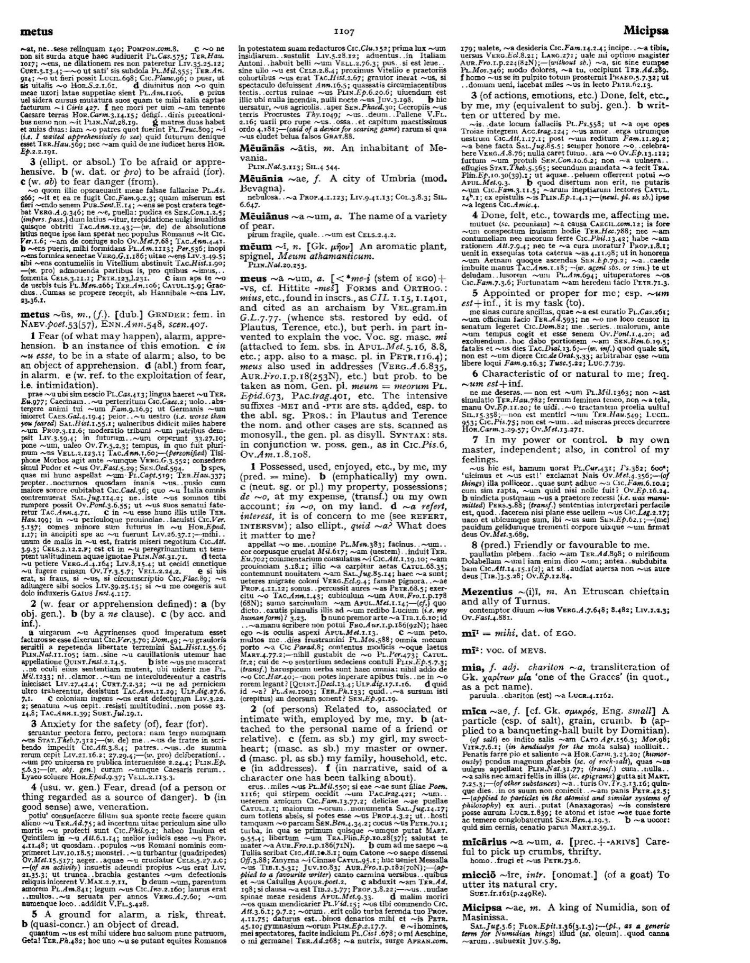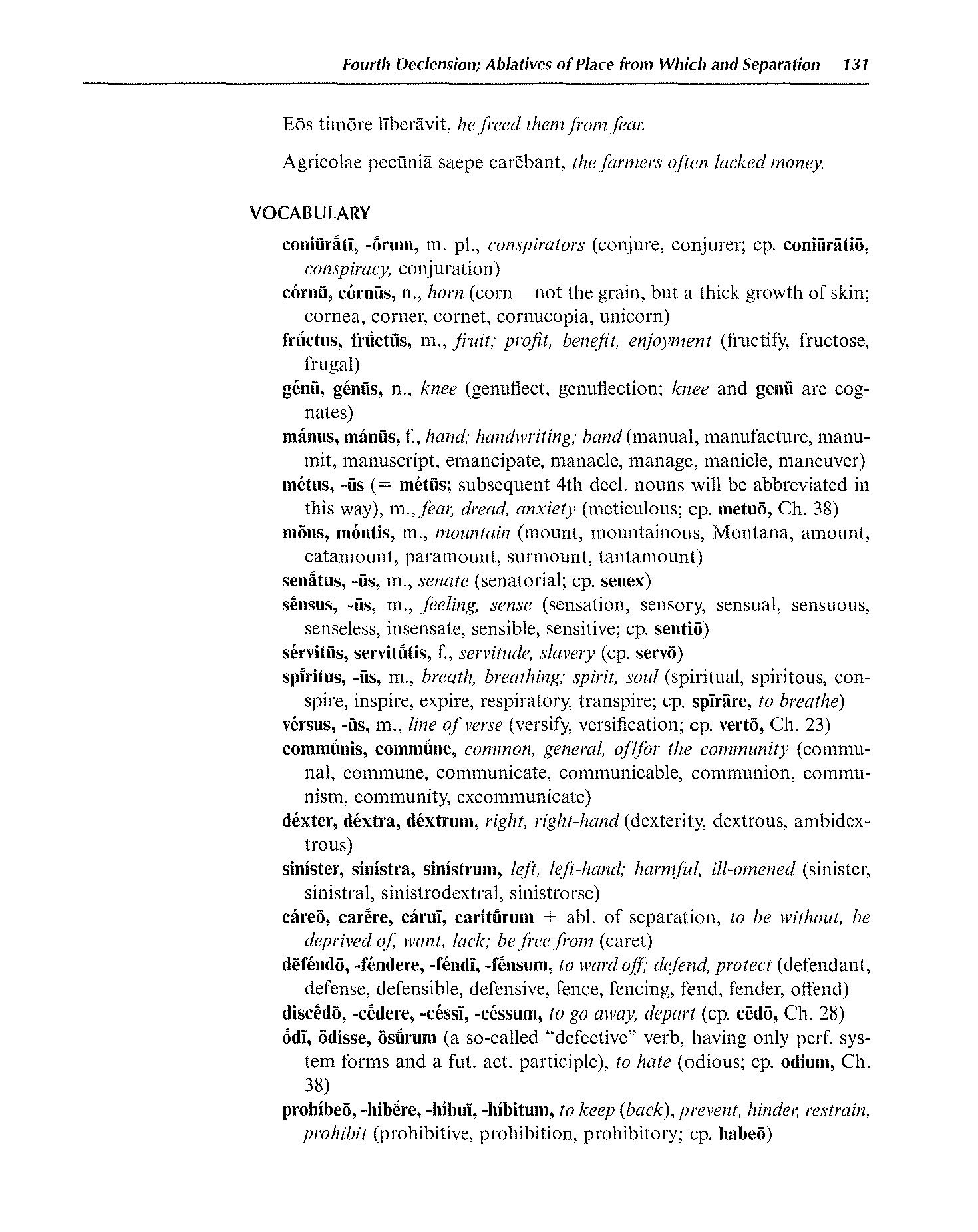
page_listing.tpl
page_subListingDetails.tpl
sub_listingDetails_style1.tpl
sub_listingDetails.title.tpl
metus fear
metus is a Latin Noun that primarily means fear.
Definitions for metus
Wheelock's Latin
Noun
- 1
fear, dread, anxiety
English derivatives:
meticulous
Oxford Latin Dictionary
Noun
- 1
Fear (of what may happen), alarm, apprehension. (b) an instance of this emotion. (c) in ~u esse. to be in a state of alarm; also, to be an object of apprehension. (d) (abl.) from fear, in alarm. (e) (w. ref. to the exploitation of fear, i.e. intimidation).
- 2
(w. fear of apprehension defined): (a) (by obj. Gen.). (b) (by a ne clause). (c) (by acc. and inf.).
- 3
Anxiety for the safety (of), fear (for).
Sentences with metus
Latin to English
Plūrimī autem virī dīvitēs multum metūs sentiunt.Compare However, very many rich men experience much fear.
Pauperēs saepe sunt fēlīciōrēs et minus metūs habent.Compare Poor men are often happier and have less fear.
Nostrīs temporibus omnēs plūs metūs et minus speī habēmus.Compare In our times we all have too much of fear and too little of hope.
Metus morienī eum terrēbat.Compare The fear of dying kept terrifying him.
Regem non faciunt opes, non vestis Tyriae color, non frontis nota regiae, non auro nitidae fores; rex est qui posuit metus et diri mala pectoris.Compare A king neither riches make, nor robe of Tyrian hue, nor crown upon the royal brow, nor doors with gold bright gleaming; a king is he who has laid fear aside and the base longing of an evil heart.
Praecipuum munus annalium reor ne virtutes sileantur utque pravis dictis factisque ex posteritate et infamia metus sit.Compare This I regard as history's highest function, to let no worthy action be uncommemorated, and to hold out the reprobation of posterity as a terror to evil words and deeds.
Libero et urbs periculum et civitas metus.Compare You have relieved both the city from danger and the state from fear.
Declension table for metus
Cactus2000
| Singular | Plural | |
| Nom. | metus | metūs |
| Gen. | metūs | metuum |
| Dat. | metuī | metibus |
| Acc. | metum | metūs |
| Abl. | metū | metibus |
Data sources
Notes
- Definitions
- Frederick M. Wheelock, Wheelock's Latin, 6th ed., rev. Richard A. LaFleur (New York, NY: HarperCollins Publishers, 2005): 131.
- P. G. W. Glare, Oxford Latin Dictionary, Vols. 1-8 (Oxford: Clarendon Press, 1982): 1107.
- Word frequencies
- Christopher Francese, "Latin Core Vocabulary," Dickinson College Commentaries, last modified 2014, http://dcc.dickinson.edu.
- Paul B. Diederich, The Frequency of Latin Words and Their Endings, PhD diss., (Columbia University, 1939).
- Louis Delatte, Suzanne Govaerts, Joseph Denooz, and Etienne Evrard, Dictionnaire fréquentiel et index inverse de la langue latine [Frequency Dictionary and Inverse Index of the Latin Language] (Liège, Belgium: Laboratoire d'analyse statistique des langues anciennes de l'Université de Liège [L.A.S.L.A.], 1981): 120.
Bibliography
Allen, Joseph H. Allen and Greenough's New Latin Grammar for Schools and Colleges: Founded on Comparative Grammar. Edited by James B. Greenough, George L. Kittredge, Albert A. Howard, and Benjamin L. D'Ooge. Boston, MA: Ginn & Company, 1903.
Crystal, David. A Dictionary of Linguistics and Phonetics. 6th ed. Oxford, UK: Blackwell Publishing, 2008.
Delatte, Louis, Suzanne Govaerts, Joseph Denooz, and Etienne Evrard. Dictionnaire fréquentiel et index inverse de la langue latine [Frequency Dictionary and Inverse Index of the Latin Language]. Liège, Belgium: Laboratoire d'analyse statistique des langues anciennes de l'Université de Liège (L.A.S.L.A.), 1981.
Diederich, Paul B. The Frequency of Latin Words and Their Endings. PhD diss., Columbia University, 1939.
Francese, Christopher. "Latin Core Vocabulary." Dickinson College Commentaries. Last modified 2014. http://dcc.dickinson.edu/latin-vocabulary-list.
Gildersleeve, Basil L., and Gonzales Lodge. Gildersleeve's Latin Grammar: Third Edition, Revised, and Enlarged. 3rd ed. London, England: Macmillan and Co., 1903.
Glare, Peter G.W. Oxford Latin Dictionary. Vols. 1-8. Oxford, England: Clarendon Press, 1982.
Krüger, Bernd. "Latin Conjugation Tables." Cactus2000. Accessed May 5, 2023. https://latin.cactus2000.de/index.en.php.
Pierson, Nick. "Sound of Text." Accessed October 26, 2019. https://soundoftext.com.
Wheelock, Frederick M. Wheelock's Latin. 6th ed. Revised by Richard A. LaFleur. New York, NY: HarperCollins Publishers, 2005.
Wiktionary Contributors. "Victionarium." Wikimedia Foundation, Inc. Updated March 18, 2019. https://la.wiktionary.org/wiki/Victionarium:Pagina_prima.
Citation
Chicago (17th ed.)
Allo Contributors. "metus, metūs (n.) - Latin Word Definition." Allo Latin Dictionary. Last modified . Accessed February 1, 2026. http://ancientlanguages.org/latin/dictionary/metus-metus.
Entry created on . Last updated on .







